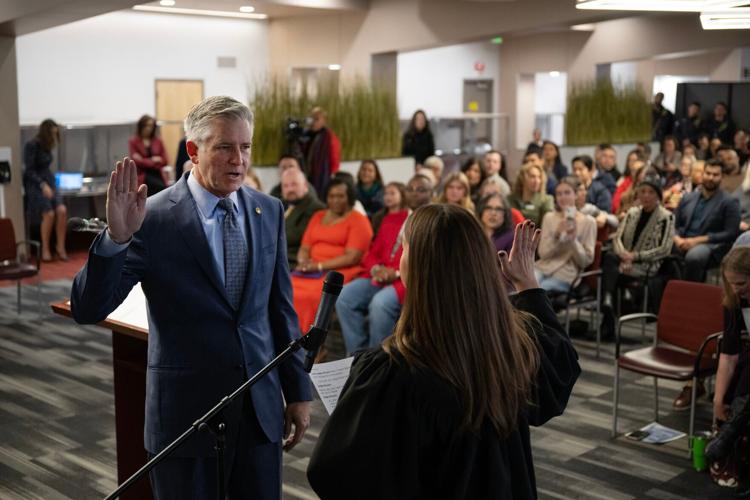Youngquist flap underscores DPS board’s foibles | Jimmy Sengenberger
As expected, drama returned to the Denver school board meeting last Thursday — and it landed with the usual thud.
Board members chastised at-large member John Youngquist for calling out a closed-door executive session on Dec. 12, which Youngquist had alleged was not properly noticed. The meeting, which concerned his request for additional compensation, saw Youngquist sent out — a move steeped in the board’s troubled history with transparency.
Member Michelle Quattlebaum had accused Youngquist of “behavior unbecoming of a board member towards DPS staff,” but not a single thing revealed on Thursday supported that claim.
The controversy stemmed from Youngquist’s ill-advised attempt to claim his full $33,000 board pay despite pension limits imposed by the Public Employee Retirement Association. As a retired educator, he risked penalties for exceeding PERA’s strict work-hour cap. Ultimately, Youngquist dropped the request, but he should have known better — Board President Carrie Olson declines pay over similar PERA concerns.
But let’s be real: DPS board members can’t justify their extraordinary compensation in the first place — up to $33,000 annually, not far behind a starting teacher’s salary. Most Colorado districts, including larger ones like Jeffco, don’t pay board members at all. Denver is one of five or six that do — and stands alone with compensation above $15,000.
Quattlebaum claimed the district spent $13,000 on 120 staff hours investigating Youngquist’s ill-fated request, which I’ve filed an open records request to verify. If true, that’s worth scrutiny — although fiscal irresponsibility hardly stops with him.
In fiscal 2022-23, Quattlebaum and Scott Esserman blew past their expense budgets by $3,022 and $4,359, respectively. Their close ally, disgraced ex-member Auon’tai Anderson, topped them both , exceeding his budget by $13,000 on conferences, hotels and two private movie screenings — including $825 split with Quattlebaum for “The Little Mermaid.”
The hypocrisy deepens. When Anderson sought reimbursement for legal fees after the board censured him for “unbecoming behavior,” they apparently discussed it behind closed doors — sending Anderson out just as they did Youngquist. The board didn’t approve a payment, yet somehow, a $3,500 payment still materialized. Then-Treasurer Esserman defended it, even as his colleagues insisted they were unaware.
Now, in an ironic twist, Esserman reportedly cites that very case to justify excluding Youngquist in December — conveniently ignoring how Anderson’s reimbursement bypassed board oversight entirely.
Let’s be real: While Youngquist’s PERA inquiry was misguided and potentially costly, his critics have zero credibility on transparency or fiscal responsibility. Perhaps that’s why Thursday devolved into six board members taking turns bemoaning Youngquist for questioning their actions — despite legal experts agreeing with him.
Media attorney Steve Zansberg and Jeff Roberts of the Colorado Freedom of Information Coalition agree the agenda item for the Dec. 12 executive session violated open meeting laws because it lacked required specificity.
Yet the board leans on General Counsel Aaron Thompson and outside counsel at Caplan & Earnest to validate its actions — a move that’s hardly reassuring. The firm, which has advised DPS since at least Spring 2021, knows these violations rarely face court challenges. Caplan & Earnest advised the board on the Tay Anderson investigation, during which DPS spent hundreds of thousands of dollars.
Hints of interpersonal staff issues surfaced at Thursday’s meeting, but members raised no specific incidents. Media reports cite two: In February, Youngquist allegedly offended Chief of Staff Debbie Staten. In emails a month later, he clashed with Thompson over legal advice about — you guessed it — an executive session.
Thompson, who is Black, responded by accusing Youngquist of perpetuating harmful racial stereotypes of “deceitfulness and manipulation,” invoking Superintendent Alex Marrero and other staff of color to “avoid additional discomfort.” Though Youngquist and Thompson reportedly resolved the matter, the exchange underscores a troubling thread: The district’s legal counsel seems more interested in deflecting criticism than addressing it.
Let’s be clear: Thompson’s track record is telling. In 2023, he didn’t object to an illegal executive session after the East High School shotting, which a judge later ruled violated the law and ordered the recording’s release. Months earlier, he greenlit a backroom meeting even after then-Director Scott Baldermann protested that he had “no idea what is gonna be discussed.” Red flags, anyone?
Meanwhile, Esserman — who has a documented history of mistreating staff without consequence — regularly gets defensive over criticisms about executive sessions, including the illegal East High session. On Thursday, he demanded Youngquist retract his allegations and admit that “the board did not violate open meetings laws, that our attorney did not violate open meetings laws.”
Not a chance, Scott: DPS must stop relying on poor legal advice to excuse its misuse of executive sessions and failure to abide open meetings laws.
One observer’s text pretty much sums it up: “So Youngquist sent a letter saying you guys are violating open meeting laws and now everyone’s feelings got hurt?”
Last week, I argued the board needed “an exceptionally compelling case” to justify yet another detour into drama. While the meeting revealed the potential cost of Youngquist’s request, it fell far below that bar. The truth is, no member of this board is above criticism right now.
If Denver’s school board can’t stop squandering taxpayer dollars and start acting responsibly, focused on student outcomes and school safety, it’s worth asking again: Do any of them deserve to get paid at all?
Jimmy Sengenberger is an investigative journalist, public speaker, and longtime local talk-radio host. Reach Jimmy online at Jimmysengenberger.com or on X (formerly Twitter) @SengCenter.






